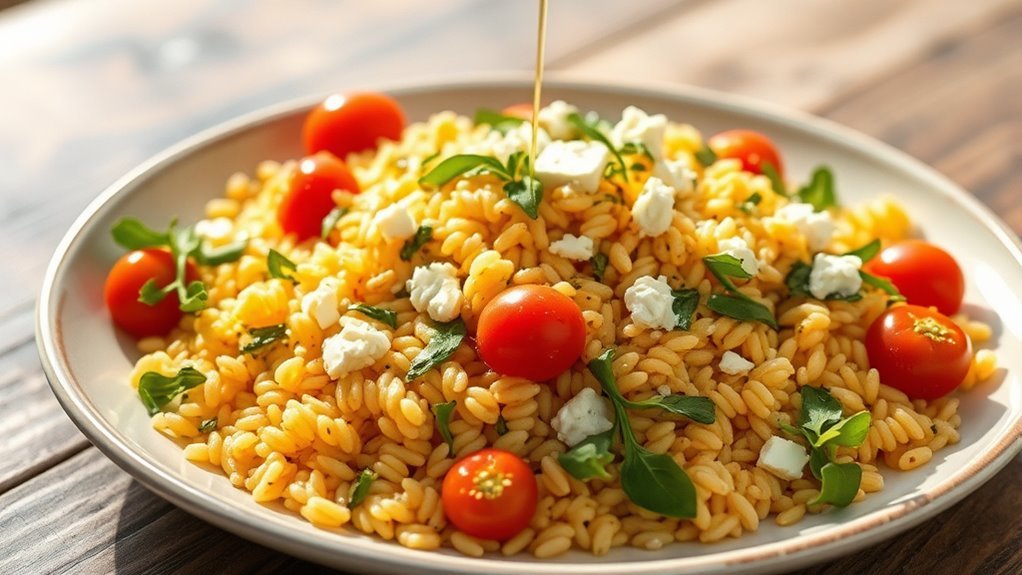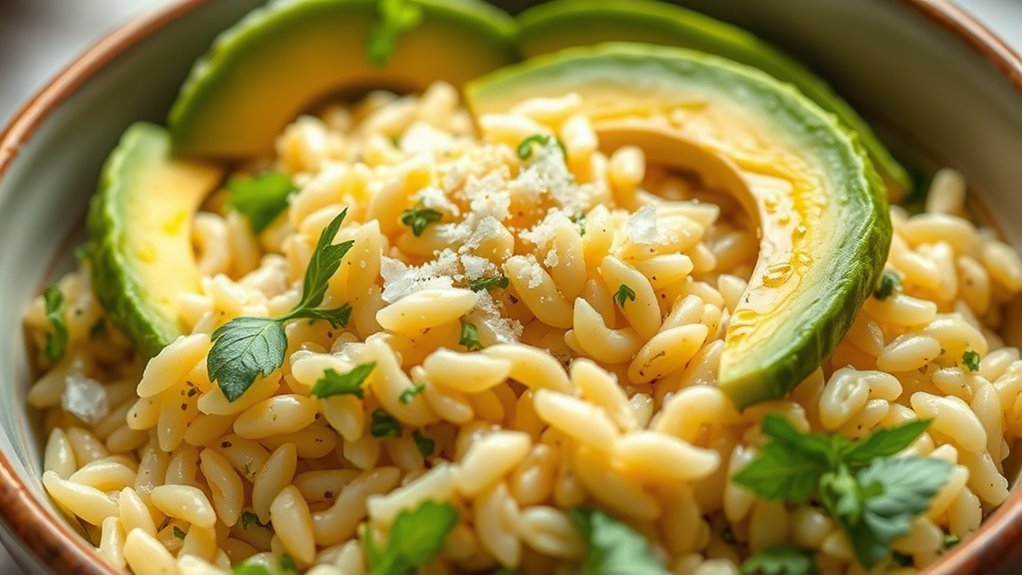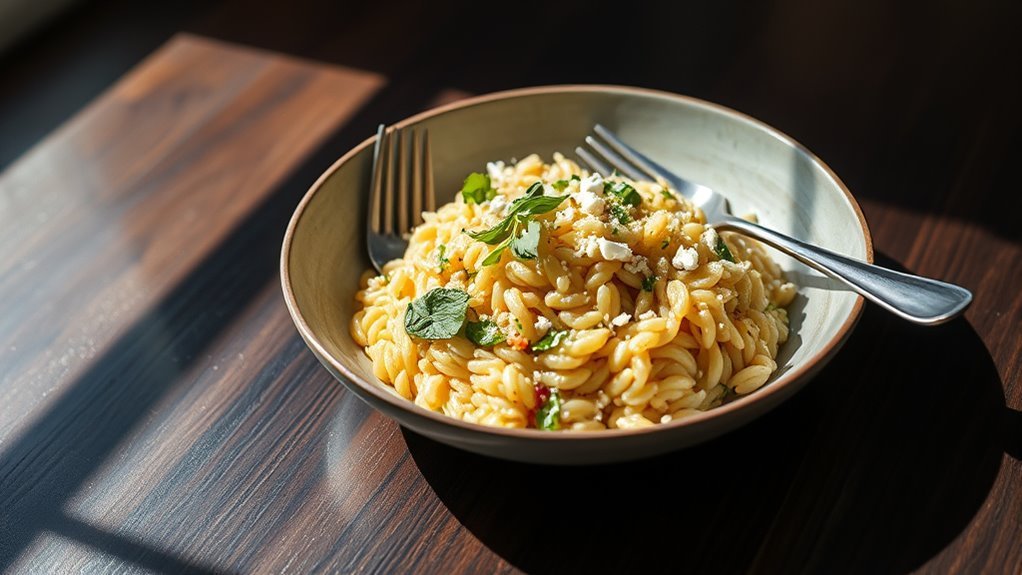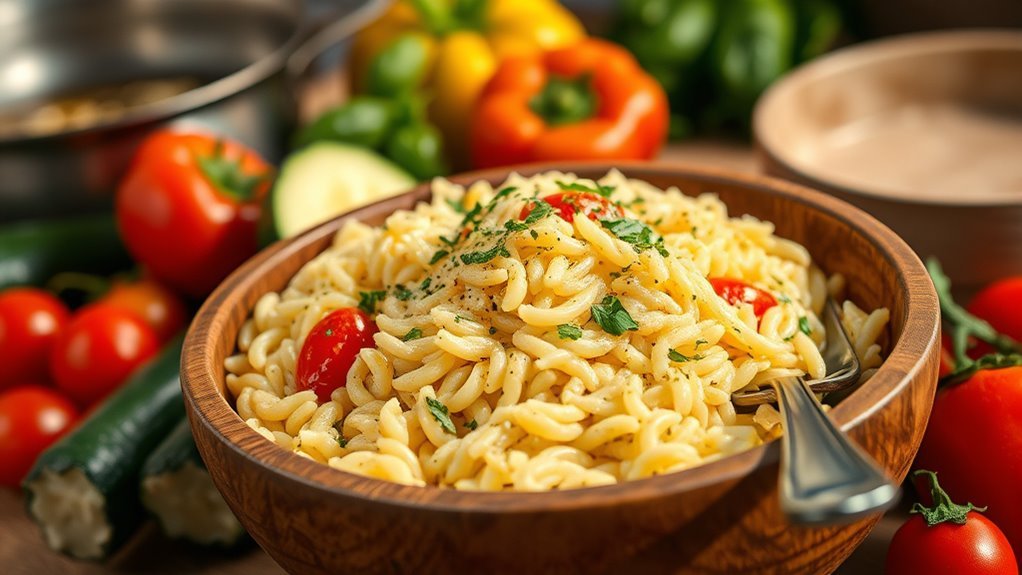Orzo isn’t keto-friendly due to its high carbohydrate content, with about 42 grams per cooked cup. This can easily disrupt ketosis as it exceeds the daily carb limit for a ketogenic diet. While it adds versatility to dishes, you’ll want to contemplate lower-carb alternatives like zucchini noodles or shirataki noodles instead. These substitutes can help you enjoy your meals while keeping carbs in check. If you’re curious about other options, there’s more to explore.
Understanding Orzo: What Is It?

Orzo, a small, rice-shaped pasta, is often found in Mediterranean cuisine. It’s versatile and can be prepared using various cooking methods, such as boiling, baking, or even frying. You can easily add it to soups or salads, making it a fantastic choice for light meals. When you’re looking for serving suggestions, think about pairing orzo with fresh vegetables, herbs, or proteins like chicken or seafood. It absorbs flavors well, enhancing any dish you create. For a delightful twist, try mixing it with pesto or a creamy sauce. Its unique texture and ability to complement diverse ingredients make orzo a staple in many kitchens, providing you with endless culinary freedom to explore.
Nutritional Profile of Orzo

While many enjoy the delightful texture of orzo, understanding its nutritional profile is essential for those following specific diets, such as keto. Orzo, made from durum wheat, offers a range of nutritional benefits, including protein, fiber, and essential vitamins. A typical serving contains around 200 calories, with a moderate amount of carbs, which can impact your keto goals. If you’re looking to incorporate orzo into your meals, consider using it in salads or as a side dish, pairing it with low-carb vegetables and healthy fats. However, be cautious with portion sizes, especially if you’re monitoring carbohydrate intake. Knowledge of orzo’s nutritional profile can help you make informed choices that align with your dietary preferences.
Carbohydrate Content in Orzo

When considering orzo as part of your diet, it’s essential to examine its carbohydrate content, especially if you’re following a keto regimen. Orzo, a rice-shaped pasta, typically contains about 42 grams of carbohydrates per 1-cup serving size when cooked. This high carb count can greatly impact your daily carbohydrate limits if you’re aiming to stay within the keto framework, which generally recommends a limit of 20-50 grams of carbs daily. As a result, incorporating orzo into your meals might not align with your keto goals. If you’re seeking low-carb alternatives, it’s vital to be mindful of portion sizes and explore options that better suit your dietary needs. Understanding orzo’s carb count helps you make informed choices that support your health journey.
Comparing Orzo to Other Pasta Alternatives
For those maneuvering a keto diet, it’s helpful to compare orzo with other pasta alternatives that may be more compatible with your low-carb goals. While orzo contains about 30 grams of carbs per cooked cup, you might consider lower-carb substitutes like zucchini noodles or spaghetti squash. These options can greatly reduce your carb intake while still satisfying that pasta craving. Additionally, shirataki noodles, made from konjac root, offer a virtually carb-free alternative and are gaining popularity among keto enthusiasts. When exploring pasta varieties, always check the nutritional info to verify they align with your dietary needs. By making informed choices about orzo substitutes, you can enjoy freedom in your meals without compromising your keto lifestyle.
How Orzo Affects Ketosis
Although orzo may seem like a tempting option for pasta lovers, its high carbohydrate content can greatly impact your state of ketosis. With about 43 grams of carbs per cup, consuming orzo puts you at risk of exceeding your daily carb limit, which can disrupt your ketosis impact. When you’re aiming for a low-carb lifestyle, it’s essential to find suitable orzo alternatives. Options like zucchini noodles, shirataki rice, or spaghetti squash can satisfy your pasta cravings without derailing your keto goals. These alternatives are lower in carbs and often higher in fiber, helping you maintain ketosis while enjoying your meals. By making smart choices, you can enjoy delicious dishes without sacrificing your commitment to a ketogenic diet.
Creative Ways to Enjoy a Keto Diet
Finding alternatives to high-carb foods like orzo can open up a world of creative possibilities for enjoying a keto diet. You can explore using spiralized vegetables like zucchini or konjac noodles as satisfying pasta substitutes. These options not only keep your carb count low but also add nutrients to your meals. For keto snacks, consider making cheese crisps or guacamole with fresh veggies; they’re delicious and fulfilling. When it comes to sweet cravings, whip up low carb desserts like almond flour brownies or coconut flour cheesecake. These treats allow you to indulge without sacrificing your dietary goals. Embracing these creative alternatives encourages freedom in your food choices, making your keto journey both enjoyable and sustainable.
Final Thoughts on Orzo and Keto
While orzo may be a beloved staple in many traditional dishes, it’s important to recognize that its high carbohydrate content makes it less suitable for a keto diet. If you’re committed to staying within your carb limits, consider exploring keto substitutes that can mimic orzo’s texture and function. Options like cauliflower rice, zucchini noodles, or shirataki noodles can be great alternatives, providing the satisfaction of a pasta-like dish without the carbs. When meal planning, incorporating these substitutes can help you maintain variety in your meals while keeping your keto goals in check. Embrace the freedom to experiment with different ingredients, and you’ll find that a fulfilling, low-carb diet is entirely achievable without orzo.
Frequently Asked Questions
Can I Use Orzo in Meal Prep for Keto-Friendly Meals?
You can’t really use orzo in your meal prep for keto-friendly meals, as it’s high in carbs. Instead, consider orzo alternatives like cauliflower rice, zucchini noodles, or shirataki noodles, which are much lower in carbs. These substitutes can add variety to your meals while keeping you within your keto goals. By incorporating these options, you’ll have delicious, satisfying dishes that align with your dietary needs and provide the freedom to enjoy your meals.
What Are Some Keto Substitutes for Orzo?
When it comes to keto substitutes for orzo, think of zucchini noodles or cauliflower rice as your trusty allies in the kitchen. Zucchini noodles, often called “zoodles,” offer a fresh, low-carb alternative, while cauliflower rice provides a versatile base for various dishes. Both options not only keep your meals light but also allow you to savor flavors without straying from your keto goals, giving you the freedom to enjoy delicious, nutritious meals.
Is Orzo Gluten-Free?
No, orzo isn’t gluten-free; it’s made from wheat, which can be a problem if you have gluten sensitivity. If you’re looking for orzo alternatives, you might consider rice, quinoa, or even gluten-free pasta made from lentils or chickpeas. These options can provide a similar texture without the gluten. Always check labels, though, to verify you’re choosing products that fit your dietary needs and give you the freedom to enjoy your meals.
How Does Cooking Method Affect Orzo’s Carb Content?
Cooking techniques don’t actually affect orzo’s carb content directly, as the carbohydrate amount is inherent to the grain. However, using methods like steaming or baking can help you control portion sizes and make it easier to pair with lower-carb ingredients. If you’re looking for carb reduction, consider using orzo in smaller amounts alongside veggies or proteins. This way, you can enjoy its flavor without overloading on carbs.
Are There Any Health Benefits to Eating Orzo Occasionally on Keto?
Sure, you can enjoy orzo occasionally on keto for a bit of balance. Think of it like adding a splash of color to a black-and-white painting; it can enhance your meal! Orzo nutrition offers carbs, which can help refuel after a workout. Just be mindful of your overall intake. As long as you’re balancing those carbs with healthy fats and proteins, orzo can fit into your keto lifestyle without compromising your goals.
-
Is orzo keto-friendly?
-
Orzo is a type of pasta that is made from wheat, which means it is high in carbohydrates. On a ketogenic diet, the goal is to limit carbohydrate intake to induce ketosis, a metabolic state where the body burns fat for fuel instead of carbohydrates. Since a standard serving of orzo can contain around 25-30 grams of carbs, it is generally not considered keto-friendly. If you’re following a strict ketogenic diet, it’s best to avoid orzo and opt for lower-carb alternatives.
-
What are some keto-friendly alternatives to orzo?
-
There are several low-carb alternatives to orzo that can fit into a ketogenic diet. Some popular options include:
- Zucchini noodles (zoodles): These are made by spiralizing zucchini and are very low in carbs.
- Shirataki noodles: Made from konjac yam, these noodles are virtually calorie-free and low in carbs.
- Cauliflower rice: Finely chopped cauliflower can mimic the texture of grains and is low in carbohydrates.
- Palmini pasta: Made from hearts of palm, this pasta alternative is low in carbs and provides a similar texture.
These substitutes can be used in recipes where orzo would normally be used, allowing you to enjoy your meals while staying within your carb limits.
-
How many carbs are in orzo compared to other pastas?
-
A typical serving of cooked orzo (about 1/2 cup) contains approximately 25-30 grams of carbohydrates. In comparison, other types of pasta generally have similar or slightly higher carb counts:
- Regular pasta: Generally contains about 40-45 grams of carbs per 1 cup cooked.
- Whole wheat pasta: Contains about 37-40 grams of carbs per 1 cup cooked.
- Gluten-free pasta: Varies widely, but can range from 30-40 grams of carbs per serving.
Compared to these alternatives, orzo is on the lower end but is still too high for a ketogenic diet.
-
Can I eat orzo in moderation on a keto diet?
-
While some individuals following a keto diet may choose to incorporate small amounts of higher-carb foods like orzo, it can be risky. Eating orzo even in moderation could lead to exceeding your daily carb limit, which typically ranges from 20 to 50 grams for most ketogenic plans. If you decide to include orzo, it’s crucial to carefully track your carbohydrate intake throughout the day to ensure you remain in ketosis.
-
What should I know before trying orzo on a keto diet?
-
Before trying orzo on a keto diet, consider the following:
- Individual tolerance: Some people may have a higher tolerance for carbs and can maintain ketosis while consuming small amounts of higher-carb foods. Monitor your body’s response.
- Meal composition: If you choose to eat orzo, balance it with high-fat and low-carb ingredients to help mitigate its impact on your overall carb intake.
- Experimentation: If you’re unsure about how orzo affects your body, consider testing your ketone levels after consumption to see if it impacts your state of ketosis.
Always prioritize whole, nutrient-dense foods that align with your dietary goals when following a ketogenic lifestyle.
References
- https://www.wikihealth.com/food/orzo
- https://www.healthline.com/nutrition/keto-diet-foods
- https://www.ncbi.nlm.nih.gov/pmc/articles/PMC7071435/
- https://www.webmd.com/diet/obesity/what-is-the-keto-diet
- https://www.thekitchn.com/what-is-orzo-229031
- https://www.mayoclinic.org/healthy-lifestyle/nutrition-and-healthy-eating/expert-answers/keto-diet/faq-20414137
- https://www.eatright.org/health/wellness/healthy-aging/what-is-the-keto-diet
- https://www.cdc.gov/healthyweight/healthy_eating/index.html


